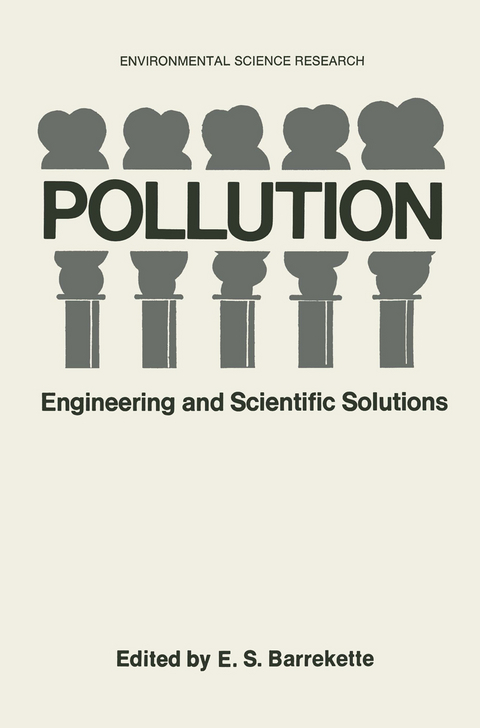
Pollution
Springer-Verlag New York Inc.
978-1-4899-0332-7 (ISBN)
1. Climatic Aspects of Pollution.- 1.1 Global Effects of Contaminants in the Upper Atmosphere.- 1.2 Climatic Aspects of Waste Heat.- 1.3 Cooling Towers and Weather Modification.- 2. Pollution and Space.- 2.1 Man-Made Alterations of the Near Earth Space Environment.- 2.2 Orbital Pollution Control.- 2.3 Global Air Pollution Monitoring from Satellites: Prospects and Problems.- 2.4 Environmental Observations from Space — The Promise and the Challenge.- 3. Air Pollution.- 3.1 A Model for Fluid Mechanical Studies of Air Pollution.- 3.2 A Systematic Method for Evaluating the Potential Environmental Impact of New Industrial Chemicals.- 3.3 Effect of Additives on Boiler Cleanliness and Particulate Emissions.- 3.4 High Temperature Dust Control — Application of a Combination Particle Collector and Heat Exchanger.- 4. Agricultural and Pest Control Aspects of Pollution.- 4.1 Solutions to Problems of Soil Pollution by Agricultural Chemicals.- 4.2 Control of Air Pollution Affecting or Caused by Agriculture.- 4.3 The Creation and Control of Pest Situations Through Engineering: Past, Present and Future.- 4.4 The Neo-Technological Landscape Degradation and Its Ecological Restoration.- 4.5 Some Aspects of the Role of Engineering in the Competition Between Insects and Man.- 5. Sulfur Dioxide.- 5.1 Sulfur Dioxide Removal from Gases, U. S.: Lime-Limestone.- 5.2 Special Problems of the Smelter Industry.- 5.3 Sulfur Dioxide Removal from Waste Gases: A Status Report from United States: Recovery Processes.- 5.4 Sulphur Dioxide Removal from Waste Gases: A Status Report from Japan.- 5.5 Sulfur Dioxide Removal from Waste Gases: A Status Report — Europe.- 6. Propellants and Explosives.- 6.1 Pollution Abatement in the Manufacture and Loading of Propellants and Explosives.- 6.2 InvestigationsRelated to Prevention and Control of Water Pollution in the U. S. TNT Industry.- 6.3 Control of Nitrogen Oxide Emissions for Nitric Acid Plants.- 6.4 Abatement of Nitrobodies in Aqueous Effluents from TNT Production and Finishing Plants.- 6.5 Explosive Incineration.- 6.6 The U. S. Navy PEPPARD Program.- 6.7 Elimination of Styphnic Acid from Plant Effluents.- 7. Solid Waste, Land Use.- 7.1 Environmental Problems and Solutions Associated with the Development of the World’s Largest Lead Mining District.- 7.2 A Study of the Effectiveness of Backfilling in Controlling Mine Drainage.- 7.3 Land Disposal of Septage (Septic Tank Pumpings).- 7.4 Resource Recovery from Municipal Waste — A Review and Analysis of Existing and Emerging Technology.- 7.5 Removal of Trace Metals from Wastewater by Lime and Ozonation.- 7.6 A Floating Settler for Low Cost Clarification.- 8. Sensing, Instrumentation, and Measurement.- 8.1 Measurement and Collaborative Testing for Implementation of Air Quality.- 8.2 The Use of Airborne Sensor Systems for Environmental Monitoring.- 8.3 Radio Wave Monitoring of the Depth and Salinity of the Water Table.- 8.4 Remote Measurement of Air Pollutants Utilizing the Raman Effect.- 8.5 Remote Sensing of Pollutants by Means of Stereo Analysis.- 8.6 Profiles of the Natural Contaminant Radon 222 as a Measure of Vertical Diffusivity.- 8.7 Spectrophotometric Determination of Indole and Skatole Using Lignine Extractions.- 9. Models.- 9.1 The Steady-State Demand-Output-Waste Economy.- 9.2 Simulation of Populations, with Particular Reference to the Grain Beetle, Tribolium.- 9.3 Pollution by Diffusive Processes.- 9.4 Computer Control of Physical-Chemical Wastewater Treatment.- 9.5 Computation and Mapping of the Dispersion and Herbage Uptake of Gaseous Effluents fromIndustrial Plants.- 9.6 Particle Deposition and Diffusivities along Smooth Surfaces.- 10. Noise.- 10.1 Industrial Noise Pollution.- 10.2 Motor Vehicle Noise.- 10.3 Engineering and Scientific Implications of Noise Control Legislation.- 10.4 Noise Pollution in Developing Countries and in Israel in Particular.- 11. National and Local Problems and Solutions.- 11.1 Environmental Protection in the U. S..- 11.2 Pollution Problems in Australia — A Large, Sparsely Populated, Rapidly Developing Country.- 11.3 The Canadian Pollution Problem — A Need for Broader Perceptions.- 11.4 A Cooperative Approach to Pollution Problems in Canada.- 11.5 Some Pollution Problems in Nigeria.- 11.6 Legal Control of Industrial Air Pollution in Israel.- 11.7 Air Pollution Trends in Tel Aviv, Israel.- 11.8 A Dual-Purpose Air Pollution Alert and Implementation System for the Greater Tel-Aviv Area.- 12. Political, Social, Educational, and Industrial Aspects of Pollution.- 12.1 Politics and Pollution: Political Solutions to a Deteriorating Environment.- 12.2 Some Economic, Spatial, Social, and Political Indicators of Environmental Quality of Urban Life.- 12.3 Teratological Hazards due to Phenoxy Herbicides and Dioxin Contaminants.- 12.4 Strategy for Maintaining Environmental Quality in Developing Technological Societies.- 12.5 Environment’s Most Dangerous Pest: Man.- 12.6 Environmental Education as a Means of Creating an Awareness of Pollution by Tomorrow’s Youth.- 12.7 Pollution and Public Information.- 12.8 Are Industry and Government Fulfilling Their Responsibilities for Pollution Control?.- 12.9 Industrial Zoning.
| Reihe/Serie | Environmental Science Research ; 2 |
|---|---|
| Zusatzinfo | XV, 784 p. |
| Verlagsort | New York |
| Sprache | englisch |
| Maße | 155 x 235 mm |
| Themenwelt | Naturwissenschaften ► Physik / Astronomie ► Allgemeines / Lexika |
| ISBN-10 | 1-4899-0332-1 / 1489903321 |
| ISBN-13 | 978-1-4899-0332-7 / 9781489903327 |
| Zustand | Neuware |
| Haben Sie eine Frage zum Produkt? |
aus dem Bereich


